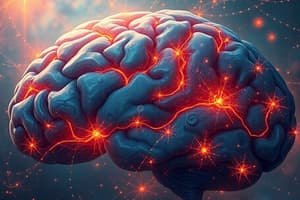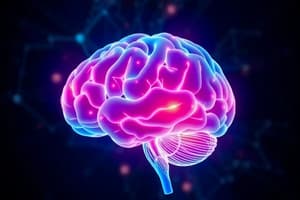Podcast
Questions and Answers
What is working memory?
What is working memory?
- A system for permanently holding and manipulating information
- A type of sensory memory
- A cognitive system with a limited capacity that can hold information temporarily (correct)
- A type of long-term memory
Which model proposes that working memory contains three components?
Which model proposes that working memory contains three components?
- The short-term memory model
- The long-term memory model
- The sensory memory model
- The multicomponent model (correct)
What is the capacity of working memory in young adults?
What is the capacity of working memory in young adults?
- Around 4-7 items (correct)
- Around 2-4 items
- Around 10-15 items
- Around 7-10 items
What is the relationship between working memory and performance in other complex cognitive tasks?
What is the relationship between working memory and performance in other complex cognitive tasks?
What is the processing speed theory of cognitive aging?
What is the processing speed theory of cognitive aging?
What is the effect of chronic stress on working memory?
What is the effect of chronic stress on working memory?
Which neurotransmitters may be involved in both ADHD and working memory?
Which neurotransmitters may be involved in both ADHD and working memory?
What is the genetic component of variability of working-memory capacity largely shared with?
What is the genetic component of variability of working-memory capacity largely shared with?
What is the effect of mood states on problem-solving?
What is the effect of mood states on problem-solving?
Flashcards
What is working memory?
What is working memory?
Working memory is a cognitive system that temporarily stores and manipulates information. It's like a mental workspace where you hold the instructions for a task or the information you need to solve a problem.
What is the capacity of working memory?
What is the capacity of working memory?
The capacity of working memory is limited, typically holding around 4-7 items or chunks of information. Think of it as a small whiteboard with limited space.
What brain areas are involved in working memory?
What brain areas are involved in working memory?
The brain regions involved in working memory include the prefrontal cortex (PFC) and the anterior cingulate cortex (ACC). These areas are involved in higher-level cognitive functions, including attention, planning, and decision-making.
Why is working memory important?
Why is working memory important?
Signup and view all the flashcards
How does working memory relate to other cognitive abilities?
How does working memory relate to other cognitive abilities?
Signup and view all the flashcards
What are some limitations of working memory?
What are some limitations of working memory?
Signup and view all the flashcards
How does working memory change over our lifespan?
How does working memory change over our lifespan?
Signup and view all the flashcards
Can working memory be trained?
Can working memory be trained?
Signup and view all the flashcards
How does working memory relate to neural disorders?
How does working memory relate to neural disorders?
Signup and view all the flashcards
Study Notes
Working Memory: Cognitive System for Temporarily Holding Information
- Working memory is a cognitive system with a limited capacity that can hold information temporarily.
- Working memory is important for reasoning and the guidance of decision-making and behavior.
- The term "working memory" was coined by Miller, Galanter, and Pribram in the 1960s.
- The multicomponent model is the most influential theory of working memory, which proposes a model containing three components: the central executive, the phonological loop, and the visuospatial sketchpad.
- Working memory is often used synonymously with short-term memory, but some theorists consider the two forms of memory distinct.
- Working memory is organized into two embedded levels: long-term memory representations that are activated and the focus of attention.
- Working memory has a capacity of about four chunks in young adults.
- Working memory capacity can be tested by a variety of tasks, including dual-task paradigms and delayed response tasks.
- Working memory capacity is strongly related to performance in other complex cognitive tasks, such as reading comprehension, problem solving, and measures of intelligence quotient.
- There are several hypotheses about the nature of the capacity limit, including limited cognitive resources, memory traces that decay over time, and interference.
- Resource theories assume that the capacity of working memory is a limited resource that must be shared between all representations that need to be maintained in working memory simultaneously.
- Working memory is a theoretical concept central to cognitive psychology, neuropsychology, and neuroscience.Working Memory: Capacity, Limitations, Development, Aging, Training, and Localization in the Brain
Capacity:
- Working memory is a system for temporarily holding and manipulating information.
- It has a limited capacity, usually around 4-7 items or chunks of information.
- The capacity can be increased through chunking and other strategies.
- Working memory is essential for many cognitive tasks, including language comprehension, problem-solving, and decision-making.
Limitations:
- There are several hypotheses about the limitations of working memory, including decay, interference, resource, and feature overwriting.
- None of these hypotheses can explain the experimental data entirely.
- The amount of trade-off between maintenance and processing depends on the similarity of the information to be remembered and the information to be processed.
- Remembering different kinds of information is easier than remembering and processing materials of the same category.
- Retrieval competition plays a role in limiting our ability to recall lists in order.
Development:
- Measures of performance on tests of working memory increase continuously between early childhood and adolescence.
- The capacity of working memory is a strong predictor of cognitive abilities in childhood.
- Working-memory capacity limits the complexity that children can handle at a given age.
- Working-memory capacity at one age predicts reasoning ability at a later age.
- Working memory increases gradually over childhood and declines gradually in old age.
Aging:
- Working memory is among the cognitive functions most sensitive to decline in old age.
- Several explanations for this decline have been offered, including the processing speed theory of cognitive aging and the inhibition hypothesis.
- Working memory depends to a large degree on the prefrontal cortex, which deteriorates more than other brain regions as we grow old.
- Age-related decline in working memory can be briefly reversed using low-intensity transcranial stimulation.
Training:
- Some studies suggest that working memory in those with ADHD can improve by training.
- Working memory training increases a range of cognitive abilities and increases IQ test scores.
- Working memory training increases the density of prefrontal and parietal dopamine receptors.
- The combined evidence from about 30 experimental studies on the effectiveness of working-memory training has been evaluated by several meta-analyses.
- The authors of these meta-analyses disagree in their conclusions as to whether or not working-memory training improves intelligence.
Localization in the Brain:
-
Working memory functions are not limited to the prefrontal cortex (PFC).
-
Spatial tasks recruit more right-hemisphere areas, and verbal and object working memory to recruit more left-hemisphere areas.
-
Most working memory tasks recruit a network of PFC and parietal areas.
-
The PFC has been found to be active in a variety of tasks that require executive functions.
-
The maintenance function is attributed to more posterior areas of the brain, including the parietal cortex.Working Memory: Neurophysiology, Genetics, and Relation to Attention and Neural Disorders
-
Working memory is the ability to hold information in one's mind for a short period and manipulate it mentally.
-
Brain imaging studies have shown that the prefrontal cortex (PFC) and the anterior cingulate cortex (ACC) are activated during working memory tasks, and people with better performance show larger activation in these areas.
-
Working memory functioning is impaired by acute and chronic psychological stress, and exposure to chronic stress can cause architectural changes in the PFC.
-
Excessive alcohol use can also result in brain damage that impairs working memory, particularly visual working memory, and there is a gender difference in how alcohol affects working memory.
-
Individual differences in working-memory capacity are to some extent heritable, and working memory capacity is correlated with learning outcomes in literacy and numeracy.
-
A randomized controlled study showed that working memory training at age six had a significant positive effect on spatial working memory, reading comprehension, mathematics, and IQ.
-
Optimal working memory performance links to the neural ability to focus attention on task-relevant information and to ignore distractions, and practice-related improvement in working memory is due to increasing these abilities.
-
An impairment of working memory functioning is normally seen in several neural disorders, such as ADHD, Parkinson's disease, Alzheimer's disease, and Huntington's disease.
-
Several neurotransmitters, such as dopamine and glutamate, may be involved in both ADHD and working memory.
-
Recent studies have shown that the same brain regions responsible for working memory are also responsible for how much humans trust those memories.
-
Mood states (positive or negative) can have an influence on the neurotransmitter dopamine, which in turn can affect problem-solving.
-
The genetic component of variability of working-memory capacity is largely shared with that of fluid intelligence.
Studying That Suits You
Use AI to generate personalized quizzes and flashcards to suit your learning preferences.




